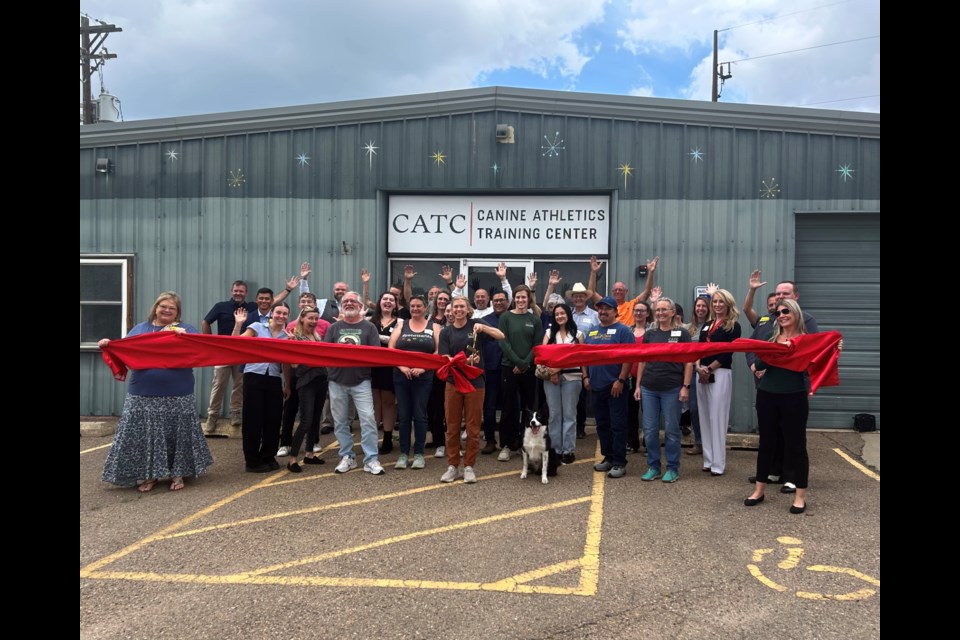On any given day at the Canine Athletics Training Center (CATC) in Longmont, dogs are leaping over hurdles, weaving through poles, and charging through tunnels — tails wagging, eyes locked on their handlers. For many, this is more than a workout. It’s a space where trust, teamwork, and confidence are built — on both ends of the leash.
“We’re really here to support dogs and their humans, wherever they are in their journey,” said Kirsten Belinsky, CATC’s owner and head trainer. “We want people to feel like they belong here.”
After years of operating through private lessons and house calls, Belinsky and her team recently moved into a new commercial facility just off Price Road. With a 5,250-square-foot agility arena and a separate 1,200-square-foot performance room, the expanded space allows CATC to meet the growing demand for dog sports in Boulder County.
Now one of the only commercial properties in Colorado dedicated to agility training, CATC stands out in a landscape where most similar programs run from residential spaces.
“Most agility training facilities are actually on residential locations at someone's house,” said Peter Wirth, CATC’s Director of Operations. “They can be great, but the issue there is that it's at someone's house, so they don't want you practicing at all hours of the day.”
At CATC, that flexibility is built in. “We have people that are renting our facilities as early as 6:00 a.m. We have people that are running the facility as late as 10:00 p.m.,” Wirth said. “We are also fortunate to have a well climate-controlled building, so you can train whether it's windy or hot outside.”
Safety and accessibility were also top priorities in designing the new space. The facility uses “gold standard” equipment seen in national competitions, and features turf with padded foam underneath to minimize impact. “That means dogs are training under realistic and safe conditions,” Wirth said.
The center now employs over ten instructors and offers a wide range of classes, from basic manners and rally obedience to scent work, conformation, and agility at all levels. This expansion comes at a time when more and more dog owners are seeking out ways to keep their pets mentally and physically engaged.
“Lots of dog owners over the last few years have realized that many dogs need more than just basic obedience training and walks to be fulfilled,” said Jae Thomas, CATC’s media director and one of its trainers. “They are looking to start agility with their pups as a way to offer them physical and mental exercise.”
Thomas said one of the most rewarding parts of the job is watching how sport training can deepen the dog-human bond. “I've seen nervous, shy dogs with no engagement become happy, engaged dog sport partners,” she said. “Seeing how much consistent sport training can build your relationship with your dog is truly inspiring.”
That transformation is grounded in CATC’s approach to positive reinforcement and trust-based learning. “We train a lot of skills through behavior offering, where we allow dogs to make their own decisions, and reward them for correct ones,” Thomas explained.
That same trust-centered approach guides how the CATC team welcomes newcomers. “A lot of times people come in and they’re a little intimidated. They don’t know where to start,” said Belinsky. “We try to meet them where they are at and make it very clear that all dogs and all people are welcome here.”
Creating an inviting, nonjudgmental space is essential to helping both people and their pets succeed, Wirth said. “Whether you're at the very beginning stages of your journey with your dog or a seasoned competitor, a sense of lightheartedness really helps.”
That sense of support and belonging is what Belinsky hopes will continue to define CATC’s future. “My biggest hope is that this space becomes a place where people can build better relationships with their dogs,” she said. “And if along the way they learn a few fancy tricks or win a few titles, even better.”



